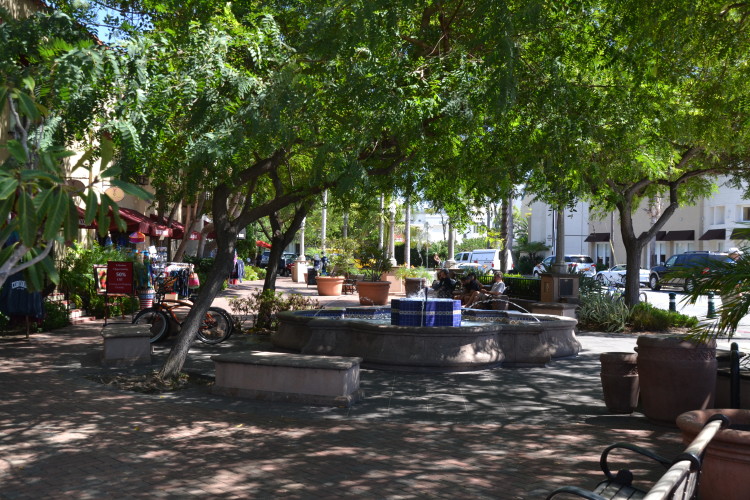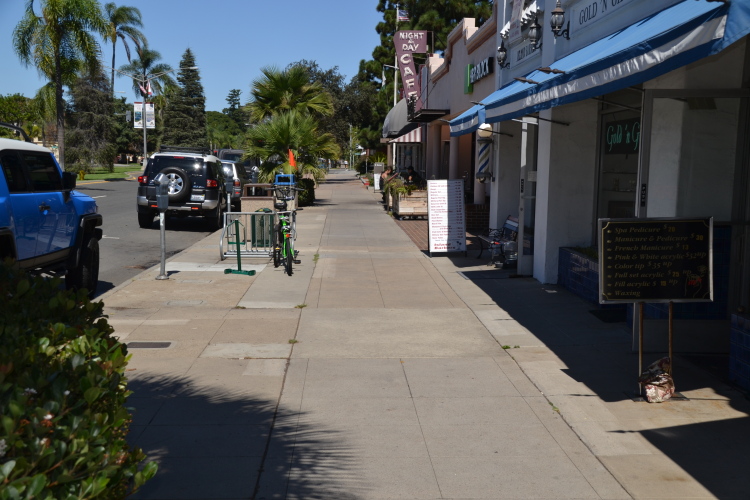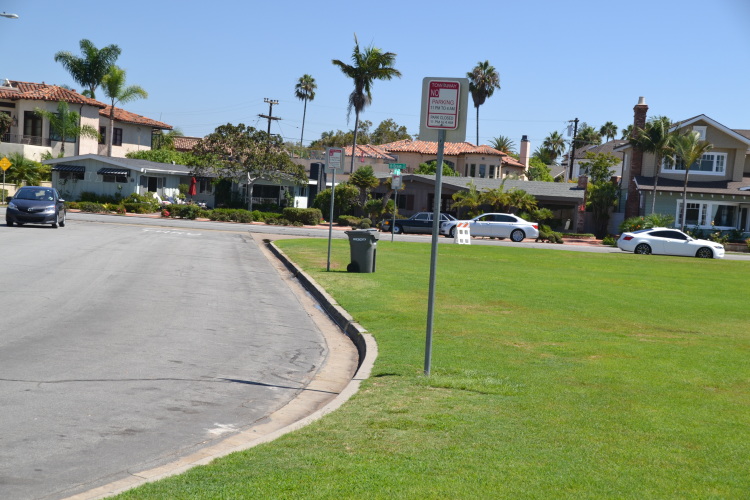
Pictured above is the landscaping and fountain that were included in the initial phase in the City’s Downtown Business Area Development Plan. Remaining phases of this plan, which was approved in 1993, are still unfunded.
The purpose of this article is to demonstrate that the City’s practice of funding over $1 million in community grants every year, $1,347,250 in the current fiscal year, has an opportunity cost, which is defined as the cost of an alternative that must be forgone in order to fund another activity.
Community grants are funded by the City’s General Fund, which is the largest fund in the City’s budget. It supports the majority of the City’s operating costs including significant transfers to other operating funds. In addition, it is used to finance the City’s capital improvements. The City’s contribution to Community Grants has consequences in terms of limiting when and if funds are available for other purposes that may be more important to the residents of Coronado.
The General Fund budget for each year is prepared by the City’s staff pursuant to a set of guidelines. These guidelines state that a goal is to present a budget that matches 12-month expenditures to 12-month revenues, thereby setting a limit on the funds that are available for expenditure. The guidelines further state that the amount that will be included for community grants will be the same as the amount provided in the previous year and the amount actually funded will be determined by the City Council. In the FY 2015/16 budget the City Council actually approved a 4.6 percent increase in the amount of community grants from $1,287,888 to $1,347,250.
As stated in the City Manager’s cover letter to the FY 2015/16 budget, the budget is a numerical representation of City Council policies, priorities and goals. Whether these priorities are shared by the taxpayers of Coronado is a question that is worth asking, particularly with respect to the allocation of almost three percent of the General Fund, $1,347,250 of $45,875,055, to community grants.
Capital improvements that are being deferred, sometimes indefinitely, are an example of the impact of allocating $1,347,250 to community grants in FY 2015/16. Two major capital projects that would significantly improve the appearance of the City’s business district are Phases III and IV of the Downtown Enhancement Project (DTEP). However, neither of these projects are planned to be funded in the current Capital Improvements Program, FY 2015/16 to FY 2019/20, adopted June 2, 2015.
DTEP Phase III is the fourth component of the City’s Downtown Business Area Development Plan that was approved in 1993, over 20 years ago. The first phase, the Adella Avenue Pedestrian Improvements project, was completed in January 2000. It included the widening of the sidewalk and installation of the fountain and landscaping at the intersection of Adella and Orange Avenues in front of the El Cordova Hotel and Brigantine Restaurant. Subsequent work on Phases I and II of the plan included the repair and replacement of the sidewalks and new street lighting along Orange Avenue to Ninth Street. These phases were completed in April 2002, over 13 years ago.
Phase III would continue the replacement of the sidewalks and installation of new street lighting on Orange Avenue from Ninth to Eighth Streets to provide a unified streetscape in the City’s business district. The project, which has been designed, is estimated to cost $1,100,000. Phase IV is similar in scope to Phase III and would enhance the pedestrian-friendly character of the 100 block of Orange Avenue. The estimated cost of this project is $1,225,000.
 Pictured is a section of the mismatched paving that would be replaced as part of Phase III of the City’s Downtown Business Area Development Plan. In addition, new street lighting would be installed as part of these improvements.
Pictured is a section of the mismatched paving that would be replaced as part of Phase III of the City’s Downtown Business Area Development Plan. In addition, new street lighting would be installed as part of these improvements.
Improvements to the City’s parks and beach are also projects that are apparently accorded a lower priority than community grants. The restroom at the Cays Park, which is the City’s largest park and has the most highly used joint-use sports fields in the city, is 33 years old and was not designed to meet the demands that are placed on it. Replacement and expansion of the restroom, which is estimated to cost $300,000, is not planned until FY 2018/19. The project to reconfigure the irrigation and resod the park is also deferred in the plan until FY 2018/19. The estimated cost of the project is $1,120,000.
Projects that would enhance the beach and Sunset Park, adjacent to it, are also not planned to be funded until FY 2017/18. The improvements to Sunset Park include upgrading the irrigation system, resodding the park, and installing a new perimeter sidewalk from the end of the existing sidewalk at Alder Street and Ocean Drive to the pedestrian ramp near the naval base gate and park playground. This project has an estimated cost of $350,000. The other project is the removal and replacement of the concrete stairs and handrails near the Central Beach restroom. These stairs, which are the main access to the beach, have been in service since the early 1900s and are at the end of their useful life. Replacement of the stairs is estimated to cost $40,000.

The Capital Improvements program also proposes the use of the General Fund to commission or purchase public art, $5,000 per year; to pay for sidewalk and alley repairs throughout the City, $200,000 per year beginning FY 2017/18; street, curb, and gutter reconstruction, $500,000 split between FY 2016/17 and FY 2019/20; and $933,000, in FY 2017/18 and FY 2018/19, to reconstruct Pomona Avenue including curb, gutter, and sewer repairs and new paving, possibly in conjunction with the undergrounding of overhead utility lines. The amounts planned for these projects could be increased and/or front loaded to accelerate some or all of this work if the funds were available.
As stated above the General Fund supports the majority of the City’s operating costs including transfers to other operating funds. One of those funds is the Recreation Fund, which will receive $2.47 million in General Fund support in FY 2015/16 for youth and recreation programs that would not be supported by fees. Additional General Fund support could allow the expansion of recreational programs or allow the fees for programs to be lowered, or both. Other funds will receive over $3.7 million in transfers from the General Fund, excluding transfers of $2.6 million to the Capital Projects Fund and $1.2 million to the Facility Replacement and Refurbishment Fund. There may have been benefits to the community by increasing the amounts of transfers in terms of improved services or operational improvements, or both.
If you would like to express your opinions about Coronado’s community grant program you can complete the survey at https://www.surveymonkey.com/r/H3Z2LWP. Also, you are encouraged to respond to this article by offering your thoughts about opportunities to improve the appearance of Coronado or the services provided by the City that could have a higher priority for funding than some or all of the community grants.
For additional background on the City’s community grant program see the recent eCoronado article Provide Your Views as the City Council Reconsiders Community Grants, published on September 9 and the previous articles Coronado Community Grant Program More Generous Than That of Other Jurisdictions, published on May 15, and Coronado Poised to Approve Over $1 Million in Community Grants, published on May 9.
John Tato
Staff Writer




